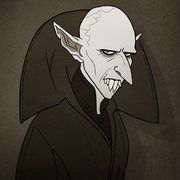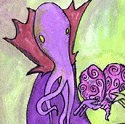|
When D&D 5e was released, it received a lot of praise from reporters and the general public for including this paragraph in the Phb: You don't need to be confined to binary notions of sex and gender. You can play as a male or female character without gaining any special benefits or hindrances. Think about how your character does or does not conform to the broader culture's expectations of sex, gender and sexual behavior. For example, a male drow cleric defies the traditional gender divisions of drow society, which could be a reason for your character to leave that society and come to the surface I know 5e was not the first game to include language like this in the rules that told players not only where making these kinds of character choices ok, but that they would have no mechanical impact. Almost encouraging players to make these decisions. What other RPGs did something similar? Blue Rose from more than a decade prior did similarly, but there must be others, indie or otherwise. Similarly for board games, for years people have called out to problems in the industry of games that have appropriate representation. Things are certainly getting better, now we have games like Spirit Island which has a more novel approach to colonialism, as well as games like Wingspan, that were both designed and had art done by a largely woman driven team. But what about board games that did this earlier, specifically around 2014 or before? Any titles come to mind?
|
|
|
|

|
| # ? May 2, 2024 01:05 |
|
Trail of Cthulhu was published in 2008 and explicitly said "Lovecraft was a racist. Even for his time, he was a flaming, horrible racist. His stories have racist undertones. Still, there's much to appreciate about his works. We have intentionally ignored the racism of the time, and investigators can be any race or gender without it affecting any story." or something to that effect. Robin Laws and Ken Hite are GOATed though, so that's probably why.
|
|
|
|
I recall some pushback when that came out. In particular, the combination of a nominally progressive few paragraphs didn't really balance out hiring some very regressive and inflammatory consultants for the playtest. I also recall some discussion about the particular language used in the D&D 5 PHB. If I were a lazy academic type (and I was), I'd start by trying to find some of the articles or posts discussing that particular paragraph from roughly the time it came out. Those would be really useful to get a sense of what else was out there at that exact moment, which seems to be what you're interested in. All the same, I can immediately think of a few. Apocalypse World has players specify a "look" for their characters. From my understanding, "look" was picked over the much more standard "gender" or "sex" blanks of the time. Look really leaves it up to players how much they want to define and how. Eclipse Phase also kind of went step by step. But they made a distinction between the ego "gender" and the morph "gender" for a while and I think talked about how those might not match. Much later, in Eclipse Phase 2E, they were still concerned with issues of gender dysphoria and mismatch between the ego and the morph that it's sleeved into. In general, Eclipse Phase is concerned with the idea of not matching the body you're currently in - it's difficult for uplifted animals to adapt to more traditional human styled morphs and vice versa. Unknown Armies has always been concerned with the stories of people on the fringes. One of the novels (I think Godwalker?) gets into ideas of how gender and societal expectations interact and clash.
|
|
|
|
Thanks, that's all helpful. Since posting this I've been able to find some more stuff out on the rpg side, very little on the board game side. It's on my list to try and dig more into the dialog about that paragraph specifically but I haven't gotten to that yet. It's been more about what other rpgs had done prior to 5e at this point and though there are not many if any real examples of other games being explicit about it in the rules there are tons of examples of them showing inclusivity through characters, language, etc.
|
|
|
|
I think a lot of games were more implicit than explicit in those choices. I remember a mean old 4chan /tg/ meme about "-4 strength" referring to a strength penalty for women characters, but I never knew what game it was from originally. But by the 2000s, I feel like most games had done away with that kind of mechanic. I also feel like representation was a big focus for more indie games, but that many of them were less likely to have a paragraph explaining that's what they were doing. For instance, Apocalypse World never explains why they used "look" as opposed to gender - they just did it. I do think historical games like Call of Cthulhu and Trail of Cthulhu were more likely to spell out how they suggested handling things like racism and sexism and the lack of mechanical representation for those.
|
|
|







